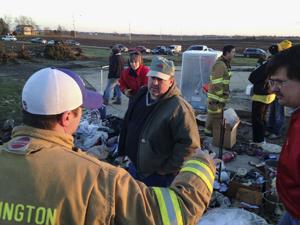(The Center Square) – With revenue shrinking amid the COVID-19 pandemic, Illinois municipalities are mulling over budget cuts, including to emergency responders.
The Peoria city council this week voted to cut two fire department engine companies, eliminating 22 jobs. Peoria Firefighters Local 50 blasted the move on its Facebook page. The union said the council continues to “brutalize firefighters.”
Councilman Zach Oyler said it is not enough and wants the city to freeze all capital expenses that are not currently being spent.
“We’ve still got work to do on this budget to actually address the gap as well as deal with the uncertain future that is in front of us,” said Oyler.
The city of Decatur is looking at numerous budget cuts, including shutting down its busiest fire station in the city, costing 27 firefighters their jobs. According to Firehouse.com, the station responded to over 20 percent of the city’s calls last year.
In Springfield, budget director Bill McCarty said union wage hike freezes are needed, but eliminating positions has to be considered.
“Furloughs and layoffs are the last resort. The mayor has made that clear from the beginning, but it doesn’t mean they are off the table,” McCarty said. “As we talked about before with the 0% raises, certainly we would like to do things that way, but we can’t force that necessarily through the collective bargaining process.”
Several cities have already voted to make budget cuts, including, Centralia, DeKalb, St. Charles, and Urbana, which cut its police department budget by 2 percent.
Chicago is in a league of its own when it comes to budget shortfalls. Mayor Lori Lightfoot this week blamed rising coronavirus case levels and two rounds of looting for a huge increase in the city’s budget gap, estimating it to be $800 million this year and more than $1 billion in 2021. Chicago pension contributions are set to spike by $1 billion over the next four years, according to Illinois Policy. Lightfoot has said layoffs could be necessary.
The Illinois Municipal League recently released a survey showing a whopping 87 percent of communities face revenue shortfalls of 20-30 percent compared to last year. The survey included results from 227 municipalities across the state. Municipalities reported shortfalls across several categories that usually generate tax revenue, including sales taxes, gaming taxes, motor fuel taxes and income taxes.







